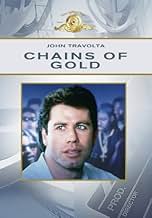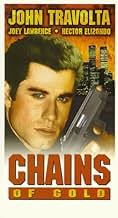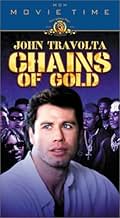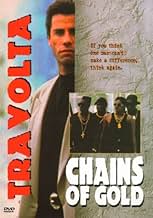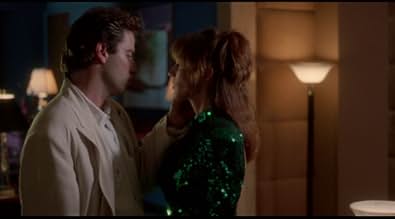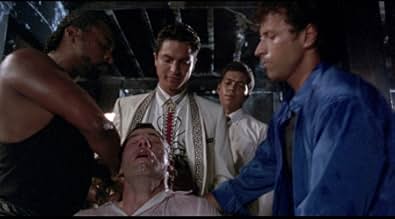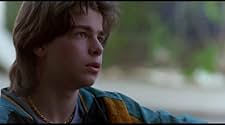NOTE IMDb
5,1/10
1,1 k
MA NOTE
Ajouter une intrigue dans votre langueA Miami social worker, Scott, helps a fatherless boy. When the boy goes missing, Scott looks for him everywhere, incl. in a crack dealing gang.A Miami social worker, Scott, helps a fatherless boy. When the boy goes missing, Scott looks for him everywhere, incl. in a crack dealing gang.A Miami social worker, Scott, helps a fatherless boy. When the boy goes missing, Scott looks for him everywhere, incl. in a crack dealing gang.
- Réalisation
- Scénario
- Casting principal
- Récompenses
- 1 nomination au total
Avis à la une
Good luck finding this - they're selling it on a cheapie DVD in Australia. One of the most obscure entries in Travolta's career, its one of those rare opportunities to see him looking this skinny.
Its absolute trash, of course, the kind of preachy exhibitionism that characterises mid-day movies, soap operas and tele-features.
*
The progression of Travolta's career seems to be characterised by almost total randomness. What is the explanation for the decisions John Travolta has made? Even his biggest, best decisions had a degree of randomness: from TV sweathog Vinne Barbarino to disco king in Saturday Night Fever? From family-movie icon in Look Who's Talking to hit-man in Pulp Fiction? Don't tell me these were the only roles available to him - not true. After Saturday Night Fever, he was the hottest thing since James Dean. He would have been offered a million scripts - hundreds of them probably great, so why the strange bomb Moment by Moment? And after Grease, when he lucked-in again, he could have had any script in Hollywood, so why the strange western drama Urban Cowboy? , he was the hottest thing since The sad truth behind this randomness is that Travolta bases his decisions of what role to take on the Hollywood religion of scientology. So instead of good characters or good dialogue in the script, good directors attached, or his agent's advice - he appeals to whatever mystical devices scientology suggests. Travolta claims that scientology knows best because it was responsible for his great decisions in the 70's (Grease, Saturday Night Fever and Welcome Back, Kotter). But in truth, scientology has been responsible for about five hits (those three, plus Pulp Fiction), and about thirty misses.
Travolta is a great actor, with terrific looks (even in expanded form) - so why is it that his career has been a series of almost random ups and downs, every now and then accidentally scoring a hit script, but mostly toiling away in rubbish like Perfect (1985), Two of a Kind (1983), Staying Alive (1983), White Man's Burden (1995), Michael (1996), Phenomenon (1996), Lucky Numbers (2000), Battlefield Earth (2000), Basic (2003). It was the same problem with Brando. Terrific actor, great looking (even in expanded form), but he picked roles based on the highest bidder. Money, instead of script and director quality. Contrast these guys with someone like Jack Nicholson - a pretty good actor, with terrible looks - but he's become a legend! He's been in scores of incredible films, one after another! What separates him? Terrific decisions - perfect decisions for that time of his life, and for his image, and for a projection of how good the final movie might be.
*
Only scientology could explain someone, even someone with not much weight in Hollywood, agreeing to do this script. Poorly written, it indulges in all the possible clichés of melodramatic trollop - and then is executed in the most trashy manner possible.
Still, Travolta is not poor. He makes us believe this crap, which is a real feat.
4/10 for Travolta, and that's very very generous.
Its absolute trash, of course, the kind of preachy exhibitionism that characterises mid-day movies, soap operas and tele-features.
*
The progression of Travolta's career seems to be characterised by almost total randomness. What is the explanation for the decisions John Travolta has made? Even his biggest, best decisions had a degree of randomness: from TV sweathog Vinne Barbarino to disco king in Saturday Night Fever? From family-movie icon in Look Who's Talking to hit-man in Pulp Fiction? Don't tell me these were the only roles available to him - not true. After Saturday Night Fever, he was the hottest thing since James Dean. He would have been offered a million scripts - hundreds of them probably great, so why the strange bomb Moment by Moment? And after Grease, when he lucked-in again, he could have had any script in Hollywood, so why the strange western drama Urban Cowboy? , he was the hottest thing since The sad truth behind this randomness is that Travolta bases his decisions of what role to take on the Hollywood religion of scientology. So instead of good characters or good dialogue in the script, good directors attached, or his agent's advice - he appeals to whatever mystical devices scientology suggests. Travolta claims that scientology knows best because it was responsible for his great decisions in the 70's (Grease, Saturday Night Fever and Welcome Back, Kotter). But in truth, scientology has been responsible for about five hits (those three, plus Pulp Fiction), and about thirty misses.
Travolta is a great actor, with terrific looks (even in expanded form) - so why is it that his career has been a series of almost random ups and downs, every now and then accidentally scoring a hit script, but mostly toiling away in rubbish like Perfect (1985), Two of a Kind (1983), Staying Alive (1983), White Man's Burden (1995), Michael (1996), Phenomenon (1996), Lucky Numbers (2000), Battlefield Earth (2000), Basic (2003). It was the same problem with Brando. Terrific actor, great looking (even in expanded form), but he picked roles based on the highest bidder. Money, instead of script and director quality. Contrast these guys with someone like Jack Nicholson - a pretty good actor, with terrible looks - but he's become a legend! He's been in scores of incredible films, one after another! What separates him? Terrific decisions - perfect decisions for that time of his life, and for his image, and for a projection of how good the final movie might be.
*
Only scientology could explain someone, even someone with not much weight in Hollywood, agreeing to do this script. Poorly written, it indulges in all the possible clichés of melodramatic trollop - and then is executed in the most trashy manner possible.
Still, Travolta is not poor. He makes us believe this crap, which is a real feat.
4/10 for Travolta, and that's very very generous.
My review was written in November 1992 after watching the movie on Academy video cassette.
Earnest with a capital E, "Chains of Gold" is a failed attempt to deal with the ongoing drug/crime wave entrapping today's youth. This 1989 MCEG production was shown on Showtime last year and is now a Christmas video release.
Opening title card indicates the film was based on actual events, but the screenplay by star John Travolta and three other writers is corny melodrama.
Travolta portrays a do-gooder social worker in Miami with major guilt over the death of his son when he was too drunk to help. He's now taken under his wing a surrogate son, Joey Lawrence, who's deeply involved in local drug dealing.
When Lawrence disappears, Travolta becomes obsessed with finding the boy and saving him. Losing his job after a fight with a superior, Travolta decides to infiltrate the drug ring, led by evil Benjamin Bratt. To this end, he enlists the aid of an old flame, Marilu Henner, who's now working as Bratt's corrupt lawyer.
The film becomes utterly unconvincing when Bratt admits Travolta to his inner circle while having his henchman closely monitor the outsider. Of course Travolta bulls his way through to a violent, offing-the-baddies conclusion, but it plays as false.
Keeping his 1970s superstar charisma and physical abilities under wraps, Travolta is tiresome in this stolid, goody two-shoes role. Pairing with Henner strikes no sparks either. Film's best performance comes from Bratt, as the brash. 21-year-old fabulously wealthy drug kingpin.
Rod Holcomb's direction varies from overly low-key in the middle reels to egregiously hokey melodrama for the finale.
Earnest with a capital E, "Chains of Gold" is a failed attempt to deal with the ongoing drug/crime wave entrapping today's youth. This 1989 MCEG production was shown on Showtime last year and is now a Christmas video release.
Opening title card indicates the film was based on actual events, but the screenplay by star John Travolta and three other writers is corny melodrama.
Travolta portrays a do-gooder social worker in Miami with major guilt over the death of his son when he was too drunk to help. He's now taken under his wing a surrogate son, Joey Lawrence, who's deeply involved in local drug dealing.
When Lawrence disappears, Travolta becomes obsessed with finding the boy and saving him. Losing his job after a fight with a superior, Travolta decides to infiltrate the drug ring, led by evil Benjamin Bratt. To this end, he enlists the aid of an old flame, Marilu Henner, who's now working as Bratt's corrupt lawyer.
The film becomes utterly unconvincing when Bratt admits Travolta to his inner circle while having his henchman closely monitor the outsider. Of course Travolta bulls his way through to a violent, offing-the-baddies conclusion, but it plays as false.
Keeping his 1970s superstar charisma and physical abilities under wraps, Travolta is tiresome in this stolid, goody two-shoes role. Pairing with Henner strikes no sparks either. Film's best performance comes from Bratt, as the brash. 21-year-old fabulously wealthy drug kingpin.
Rod Holcomb's direction varies from overly low-key in the middle reels to egregiously hokey melodrama for the finale.
John Travolta is social worker Scott Barnes, a person adamant about keeping the kids of some innercity area of California from giving into the rampant drug circles that work the street. He's been working the job for so long, he knows the dealers by name, and they know him.
The job gets personal when a close friend of his, a 13 year old boy named Tommy (Joey Lawrence), starts dealing. Unfortunately, Tommy has already become much more involved in the "Youth Incentive Program," which is the name for the dangerous clan of cocaine dealers that run the area. Travolta figures that he owes it to Tommy to help him, seeing this as an opportunity to redeem himself after having accidentally killed his only son in an accident where Scott was drunk.
Scott, the bold idealist that he is, goes undercover in one of the most dangerous drug rings (which reminds me a lot of Shredder's underground gang from the Teenage Mutant Ninja Turtles movie), hoping that he can rescue Tommy from their grips before it's too late.
Though the message is good, considering it is a powerful statement especially where kids are messing up their lives in being hooked on this stuff (they run like rats in the daylights to protect their stash) because they're sold on the false philosophy that they'll become filthy rich. Likewise, it illustrates the failures of the system as Scott tries so hard for other government agencies to help him out and put an end to the mess that he's witnessed for so long. But, it does in part seem a little too unrealistic, detracting from the importance of this message somewhat, as Scott, by himself, tries to disguise himself and his motives from a very ruthless leader (Benjamin Bratt) and his even more ruthless gang of drug dealing thugs. When the stakes are high, these guys will do whatever it takes to protect their product and their money. But is Scott able to do much more to protect Tommy?
The job gets personal when a close friend of his, a 13 year old boy named Tommy (Joey Lawrence), starts dealing. Unfortunately, Tommy has already become much more involved in the "Youth Incentive Program," which is the name for the dangerous clan of cocaine dealers that run the area. Travolta figures that he owes it to Tommy to help him, seeing this as an opportunity to redeem himself after having accidentally killed his only son in an accident where Scott was drunk.
Scott, the bold idealist that he is, goes undercover in one of the most dangerous drug rings (which reminds me a lot of Shredder's underground gang from the Teenage Mutant Ninja Turtles movie), hoping that he can rescue Tommy from their grips before it's too late.
Though the message is good, considering it is a powerful statement especially where kids are messing up their lives in being hooked on this stuff (they run like rats in the daylights to protect their stash) because they're sold on the false philosophy that they'll become filthy rich. Likewise, it illustrates the failures of the system as Scott tries so hard for other government agencies to help him out and put an end to the mess that he's witnessed for so long. But, it does in part seem a little too unrealistic, detracting from the importance of this message somewhat, as Scott, by himself, tries to disguise himself and his motives from a very ruthless leader (Benjamin Bratt) and his even more ruthless gang of drug dealing thugs. When the stakes are high, these guys will do whatever it takes to protect their product and their money. But is Scott able to do much more to protect Tommy?
An enjoyable film in my mind. Travolta is especially good in a movie about a social worker's determination to save his friend after he is kidnapped by the drug dealers that he worked for. Sure, this is hardly a perfect movie, but it will entertain you for 95 minutes.
I'm assuming that John Travolta decided to take things in his own hands at the time of making this movie, seeing that his career was in a slump at the time. I assume that because Travolta is credited as being one of the four screenwriters of this movie. It must have hurt when the finished product was shelved for some time before being dumped directly to cable TV, though I'm pretty confident that the movie wouldn't have done well if it had been released to theaters. It's pretty apparent this was a low budget movie, with such attributes as poor photography and dimly lit sequences. In fact, despite all the swearing, violence, and drug scenes, the movie feels like it was made for TV. The screenplay contains some howlers like interracial gangs, but it's a mostly dull and slow-moving affair. Bernie Casey and Hector Elizondo are good, but there's only so much they can do in their limited roles. As for Travolta, while he's been good in other movies, you wouldn't know it from his performance here. His swearing, getting uppity and saying such things as "How dare you?", crying, and bulging eyes suggest a director who was reluctant to reign him in for some unknown reason. The only reason to see this is to try and figure out how this got re-released (on DVD) a few years ago.
Le saviez-vous
- AnecdotesDirector of photography Dariusz Wolski was fired two weeks before the end of filming and replaced by Bruce Surtees.
- GaffesWhen Travolta goes to identify the boy at the morgue, the battery pack for his microphone is clearly visible sticking out of his back pocket.
- ConnexionsReferenced in The Cinema Snob: Cut-Throats Nine (2014)
- Bandes originalesVenezuela
Composed by Robert J. Walsh
Meilleurs choix
Connectez-vous pour évaluer et suivre la liste de favoris afin de recevoir des recommandations personnalisées
- How long is Chains of Gold?Alimenté par Alexa
Détails
- Date de sortie
- Pays d’origine
- Langue
- Aussi connu sous le nom de
- Les seigneurs de la ville
- Lieux de tournage
- Sociétés de production
- Voir plus de crédits d'entreprise sur IMDbPro
Box-office
- Budget
- 10 000 000 $US (estimé)
Contribuer à cette page
Suggérer une modification ou ajouter du contenu manquant


